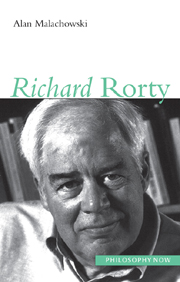2 - Conversation
Summary
If we see knowledge as a matter of conversation and of social practice, rather than as an attempt to mirror nature, we will not be likely to envisage a metapractice which will be the critique of all possible forms of social practice.
(PMN: 171)In Philosophy and the Mirror of Nature, Rorty contends that, from Plato onwards, Western philosophy has viewed itself as just such a ‘metapractice’. He argues that it should now cease to do so because there is no longer much point in ‘seeing knowledge’ as anything more than ‘a matter of conversation and social practice’. Rorty's critics tend to sneer at the contention because they singularly fail to grasp how much is packed into the notions of ‘conversation’ and ‘social practice’. For this reason, they cannot help substituting a derogatory, reductive “merely” for “anything more than”. This chapter shows how to avoid such a crass lack of understanding of Rorty's position.
He only ever makes occasional, modest, low-key references to it in his later writings, but PMN was a major achievement by any standards. It had great influence on Western philosophy by opening up new areas for discussion and highlighting the work of thinkers hitherto marginalized (e.g. Heidegger), ignored (e.g. Foucault and Derrida) or simply forgotten (e.g. Dewey). But it also had a big impact on intellectual culture as a whole. Its revisionary conception of epistemic justification “as a social phenomenon rather than a transaction between ‘the knowing subject’ and ‘reality’” (PMN: 9) provided much provocative food for thought in diverse areas ranging from literary theory to legal studies.
- Type
- Chapter
- Information
- Richard Rorty , pp. 37 - 66Publisher: Acumen PublishingPrint publication year: 2001

